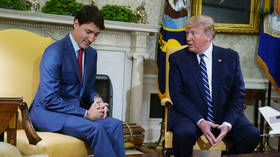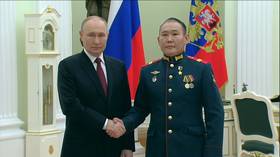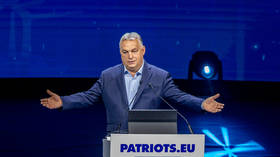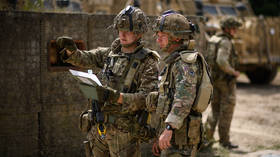Gaddafi's son, 8 other former government officials sentenced to death by 'Libyan militia'
Saif al-Islam Gaddafi, the surviving son of Libya’s slain leader Muammar Gaddafi, has been sentenced to death in the country along with several other members of the former government.
Breaking: Libya court sentences Gaddafi's son Seif al-Islam, eight others to death
— Bel Trew - بل ترو (@Beltrew) July 28, 2015He was sentenced in absentia on Tuesday along with other senior members of the former Libyan government, including Abdullah Senussi, Gaddafi’s former intelligence chief, and two former prime ministers, al-Baghdadi al-Mahmoudi and Abuzaid Dorda.
There were a total of 32 defendants tried in Tripoli, with the rest 23 handed down lesser punishments of prison sentences and fines.
Gaddafi's son Seif al-Islam - was not present in the courtroom - #Libya
— Bel Trew - بل ترو (@Beltrew) July 28, 2015“I think that the world witnessed a legal farce, which showed that the judicial system in Libya is no more independent and impartial unfortunately,” Amal AlAkuri, wife of the sentenced Abuzaid Dorda told RT. “The trial took place in a military barrack controlled by militia with weapons pointed at the judges and lawyers.”
Verdicts given by Libya court, range from 12 years in prison with financial penalties to death with firing squad for Seif & Others. #Libya
— Free Libya Now (@Liberty4Libya) July 28, 2015The trial was conducted in Tripoli by an unrecognized Islamist government that came to power after forcing a rival government out of the Libyan capital. The trial lasted just two days and can hardly be called fair, lawyer John Jones, who was involved in defending Saif al-Islam Gaddafi, told RT a day before the ruling.
“It was clearly a show trial in respect to all of the defendants,” Jones said. “It was basically a trial by militia.”
Protests in #Sirte calling for the release of Gaddafi figures A Green flag can also be seen in the streets of Sirte pic.twitter.com/qtnr6e7DHx
— TRIDENT_RISKS (@TRIDENT_RISK) July 23, 2015Earlier Tuesday, after the proceedings had just started, Jones said an atmosphere of intimidation hung over the entire proceedings.
“Lawyers were intimidated, the judges are intimidated, lawyers had had to leave the case,” he said.
READ MORE: ‘Being called Gaddafi is enough to condemn people in the eyes of the world' – lawyer
Providing evidence of the alleged crime was not a priority either, he added.
“The prosecution is not calling any witnesses to be cross-examined. They are relying on interrogations, which are often tainted by torture. And the defense was only allowed two witnesses and no protection was given to them,” he said.
Watch @MFinoshina_RT interviewing Saif al-Islam #Gaddafi in 2011 who was sentenced to death by Tripoli court today https://t.co/BgtIDyk7gK
— RT (@RT_com) July 28, 2015The UN human rights office said it was "deeply disturbed" by the death sentences.
"We had closely monitored the detention and trial and found that international fair trial standards had failed to be met," it said in a statement.
Human Rights Watch deputy Middle East and North Africa director, Joe Stork, agreed, saying the defendants were not given a fair and transparent trial they deserved.
“This trial has been plagued by persistent, credible allegations of fair trial breaches that warrant independent and impartial judicial review,” he said.
The Tripoli authorities moved forward with the trial of Gaddafi-era officials in a bid to build more legitimacy, both domestically and with foreign powers, said Catherine Shakdam from the Beirut Centre for Middle East Studies.
“The message is that the want to play government, that they are here to say and that they are trying to rule Libya. If not by legitimacy, then they would to it de facto anyway,” she told RT. “They are trying to establish a sense of normality by trying to conduct legal affairs and state affairs.”
The Libyan government-in-exile currently residing in the eastern city of Tobruk condemned the trial of Saif al-Islam Gaddafi and the other statesmen.
READ MORE: Libya war crimes trials - ‘form of judicial terrorism’
Saif was captured in November 2011 shortly after his father’s summary execution by the rebel forces, as he was trying to leave Libya. He was kept in custody by a local militia in the city of Zintan for months, as the militants refused requests from an internationally recognized government in Tripoli to hand him over for trial.
Both Gaddafi and Senussi were indicted by the International Criminal Court and Libya was ordered to hand them over for trial in The Hague. The Libyan government didn’t comply and even detained a team of ICC lawyers for a month, accusing them of delivering prohibited documents to Gaddafi.
Before the fall of Muammar Gaddafi’s government amid a NATO bombing campaign that devastated the country’s army and allowed rebel forces to seize control, Saif al-Islam Gaddafi was considered the second most powerful person in Libya.
A London-educated, fluent English-speaking PhD graduate, he supervised the investment of the nation’s multibillion dollar reserves generated by oil trade into foreign assets.













